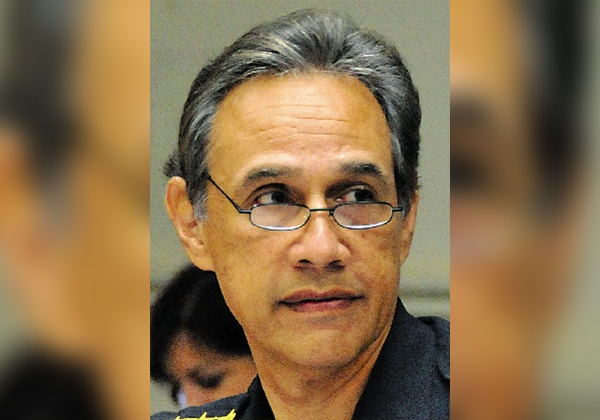LIHUE — The Kauai Police Department may become the first law enforcement agency in the state with all officers wearing body cameras. Chief of Police Darryl Perry said the issue is timely given the civil unrest over police actions in
LIHUE — The Kauai Police Department may become the first law enforcement agency in the state with all officers wearing body cameras.
Chief of Police Darryl Perry said the issue is timely given the civil unrest over police actions in Ferguson, Mo. Technology has made it possible for officers to clip pager-sized cameras to their uniforms, sunglasses or head gear to record point-of-view high definition video and audio of their public interactions.
“For situations like this it would be helpful to have body cameras,” Perry said.
Acting Capt. James Rodriguez and Officer Stacy Perreira provided a presentation at Friday’s Police Commission meeting on the AXON flex body worn camera project. The manufacturer, Taser, conducted long-term studies at police departments around the United States to show a dramatic drop in complaints against officers along with a reduction of use of force by police.
Perry said the system could track conduct and would “red flag” officers of concern. The department could take proactive measures to address issues and provide training in making arrests.
The technology ensures transparency and proper police procedures, as well as to protect the officer and the department from false claims of excessive use of force, Rodriguez said. Departments involved in studies report a nearly 90 percent drop in citizen complaints, and use of physical or deadly force was down nearly 60 percent.
Officers in the studies expressed a willingness to wear the cameras to protect them from false claims on the job and to aid in investigations with an unbiased recreation of events using HD video quality that makes even low-light recording possible. Prosecutors involved in the study report that faster plea deals occur with the video evidence.
“We support this initiative, as we support transparency and openness in law enforcement operations,” said County Prosecuting Attorney Justin Kollar by email. “These cameras will encourage the public’s trust in the actions of law enforcement and also in many instances help us to make better cases by showing us exactly what happened.”
Commissioner Mary Kay Hertog asked that policies and procedures be clear about officer responsibilities with recording.
Perreira said officers would have the ability to turn cameras on or off, and can view footage through wireless connection to smartphones but cannot edit or delete files. The cloud-based system allows detectives, internal affairs and prosecutors faster access.
The study showed point of view video aided with the recovery of officers involved in deadly force incidents. Reviewing the actual footage of their actions helped restore officers who would otherwise rely on their own memory of a traumatic event.
No timetable was given, but Perry said they want to get the system and cameras as soon as possible, using forfeited funds obtained through criminal activity. It would be incorporated into the police budget in subsequent years.
Perreira said first year costs would total $150,360 for 127 units and 13 docking stations. The annual cost to maintain the system and the web-based computerized video management system would be about $66,000.
Commissioner Randall Francisco asked what the department could expect with civil rights issues while recording the public.
Perry said when officers respond in a public setting there is no expectation of privacy.
There could be challenges for unlawful entry and wrongful arrest that come up in the future, Perry added. Video is still preferable to handling complaints against police that are not recorded.
“The investment in this technology is minimal compared to the cost of litigation,” Perry said.
Under Hawaii state law, it is illegal to intentionally intercept or disclose intercepted communications. However, secret recording or eavesdropping is legal when one-party offers consent or the recording is a non-trespassing participant in the communication — provided it is not to commit an illegal act.
A 2013 ACLU report expressed concern for the proliferation of public surveillance, but supports body cameras to protect against abuse of power. Body cameras have the potential for “helping protect the public against police misconduct, and at the same time help protect police against false accusations of abuse,” as do cameras in police cars, prisons and during interrogations, the report stated.
The ACLU recommends that cameras be limited to uniformed officers and marked vehicles. Policies should ensure cameras are not used to surreptitiously gather intelligence against protected speech, associations, or religion.
Commissioner Hertog said the county could let people know they will be recorded and that no violation of their rights will occur so long as officers use the cameras in their official capacity.
“I fully support trying to pursue something like this,” Hertog said.


